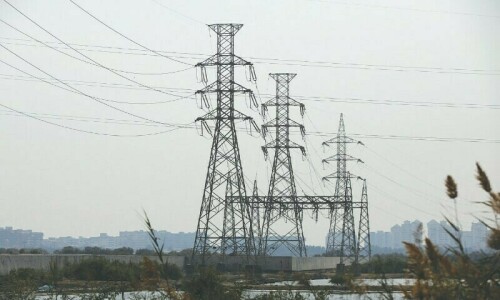IN its first full-year budget for the next fiscal year, the Imran Khan government is aiming to bring down the primary (budget) deficit to 0.6 per cent of GDP by focusing on plugging the loopholes in the indirect tax regime, withdrawing the tax exemptions to exporters and others, going after retailers, and blocking avenues of whitening illegal money through investments in property. The primary deficit is the difference between expenditures (net of debt servicing) and net federal revenues (after adding provincial surpluses). The overall fiscal deficit, however, is envisaged to remain at nearly the same level as this year’s.
The tax measures announced by Minister of State for Revenue Hammad Azhar in his budget speech propose to do away with the “non-filer regime” by making the failure to file tax return a punishable criminal offence, though late filers have been given the option to come onto the Active Taxpayer List, something that the law prohibited thus far. It also aims to bring all kinds of income — including but not limited to ‘gift income’ that was estimated to have reached Rs256 billion during the last financial year — into the direct tax net.
Broadly speaking, the suggested tax measures indicate an effort to shift the country’s tax policy from presumptive tax regime to normal tax regime and tighten the noose around tax dodgers and avoiders by aligning the budget proposals with the government’s tax amnesty scheme and the law prohibiting benami transactions.
Government proposes to do away with the non-filer regime by making failure to file tax return a punishable criminal offence
But it is only the first step. A lot still remains to be done to document the economy and realise the full potential of tax revenues. The tax proposals also attempt to ‘right the wrongs’ done by the Pakistan Muslim League-Nawaz in its last budget, according to the minister, and reverse the impact of its tax measures on the deteriorating fiscal situation of the government.
Overall, the tax proposals clearly indicate that it is an endeavour on the part of the new finance team, led by Adviser to the Prime Minister on Finance Dr Abdul Hafeez Shaikh, to meet the pre-conditions of the $6bn IMF facility that his government hopes to accede to after the passage of the finance bill. The International Monetary Fund had termed the budget 2019-20 a critical step in the (Pakistani) authorities’ fiscal (stabilisation) strategy at the time of reaching the staff-level agreement with Islamabad last month. Simultaneously, the effort is aimed at implementing FATF (Financial Action Task Force) demands to cap the holes available for terror financing and money laundering.
Read: Take-home salary to take a hit thanks to new income tax brackets
While aiming to grow its tax revenues at the fastest pace in the country’s history, the government has made an attempt to give a populist face to the budget by setting aside Rs271.5bn for the energy and other subsidies for the poor and low-income households in what is being dubbed “austerity” budget. Yet, by halving the income tax exemption ceiling to Rs600,000 it has wittingly or unwittingly brought a lot of burden on the fixed-income salaried classes who are already coping with the surging price inflation. The planned increase in the energy prices going forward as part of the IMF package will likely bring more pain for the middle-income groups, impacting on the PTI popularity in the urban centres of the country.
Overall, analysts describe the suggested tax measures as positive for movement towards documentation of the economy. “The budget is the best possible attempt in years in the direction of economic stabilisation and fiscal consolidation by streamlining the tax administration and moving from presumptive tax regime to normal tax regime,” insisted Asif Qureshi, the chief executive officer of Optimus Capital Management. “Whether or not the government succeeds in implementing its policies to achieve the tax revenue target remains a question.”
In spite of the hefty increase of Rs1,450bn in its tax target for the next year, projected provincial cash surplus of Rs423bn and some spending cuts to rein in bulging consolidated fiscal deficit, the gap between income and expenditure is estimated to rise to 7.2 per cent because of debt payments estimated to be Rs2,891.4bn.
Ali Asghar Poonawala, a financial analyst at AKD Securities, was of the view that the failure to collect the targeted tax would not be an option for the government. “The tax target is difficult to meet in a slowing economy where the government is trying to compress the demand further. The lower-than-target collection will mean steeper cuts in development expenditure or breach of the fiscal deficit target.”
The doubts over the PTI government’s ability to collect the target revenues are compounded by its confrontation with the lawyers over a reference sent to the Supreme Judicial Council against Justice Qazi Faez Isa of the Supreme Court and the start of a new round of its confrontation with the PPP and PML-N over the arrest of their key leaders — Asif Ali Zardari and Hamza Shahbaz — on alleged corruption charges at a time when it desperately needs the opposition’s cooperation to stand faltering economy back on its feet.
But then the PTI leadership is not famous for choosing its fights wisely even when the situation on the ground demands its full focus on the economy. The opposition’s mood during the budget speech is anything but a reflection of the things to come. The possibility of the businesses affected by the new tax measures joining the opposition against the ruling party could make the task of stabilising the economy even more difficult as the situation unfolds over the next several weeks or months.
Published in Dawn, June 12th, 2019














































